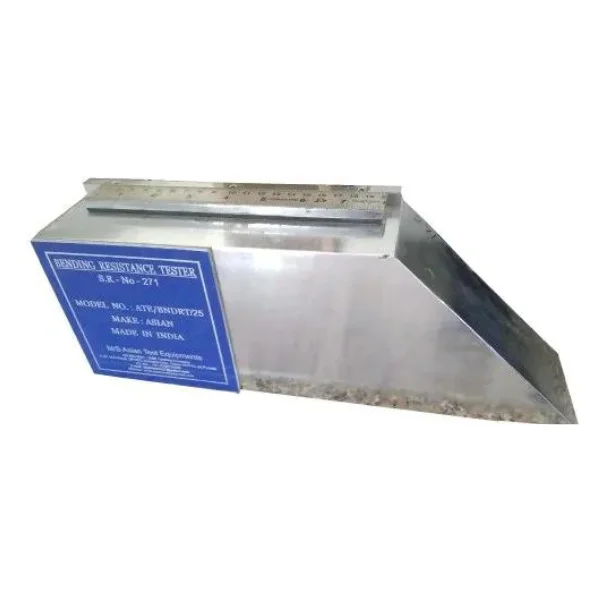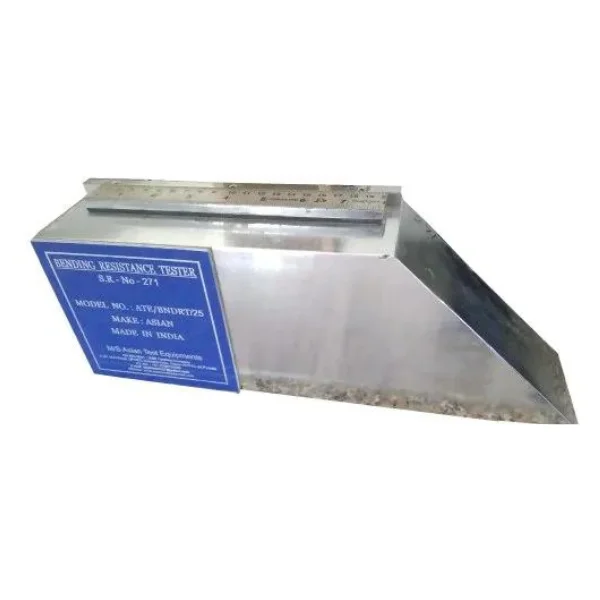
A bending resistant tester is a device or instrument designed to assess the resistance of materials, typically thin or flexible materials, to bending or flexural stress. This type of testing is important in various industries where materials need to withstand bending forces, such as in the manufacturing of electronic components, medical devices, packaging materials, and more. The tester typically applies a controlled force to the material, causing it to bend or flex. The goal is to evaluate t....
A bending resistant tester is a device or instrument designed to assess the resistance of materials, typically thin or flexible materials, to bending or flexural stress. This type of testing is important in various industries where materials need to withstand bending forces, such as in the manufacturing of electronic components, medical devices, packaging materials, and more.
The tester typically applies a controlled force to the material, causing it to bend or flex. The goal is to evaluate the material's ability to resist deformation or breakage under these conditions. Bending resistance testing is crucial for ensuring the durability and reliability of products in real-world applications.
Key features of a bending resistant tester may include:
Force Application Mechanism: The tester applies a specific force to the material, either through a mechanical system or a hydraulic/pneumatic system.
Adjustable Parameters: Users can often adjust testing parameters such as the force applied, the rate of force application, and the number of cycles.
Sample Fixturing: The tester typically includes fixtures or clamps to securely hold the material in place during testing. This ensures that the bending force is applied uniformly to the test specimen.
Data Acquisition System: Many bending resistant testers come equipped with a data acquisition system to record and analyze the results of the test. This may include measurements such as the degree of bending, applied force, and any signs of material failure.
Compliance with Standards: Bending resistant testers are often designed to comply with industry standards and testing protocols to ensure consistency and comparability of results.
Safety Features: To ensure operator safety and prevent damage to the equipment, bending resistant testers may include safety features such as emergency stop buttons and protective enclosures.
These testers play a crucial role in quality control and product development, helping manufacturers ensure that their materials meet the necessary standards for performance and reliability. The specific design and features of a bending resistant tester can vary based on the intended application and industry requirements.

Corrosion test chamber is a great laboratory test equipment widely used in metal...
Cyclic Corrosion Salt Spray Chamber manufactured by Sigma Machines – the world...
Sigma Machines CASS tester is designed keeping in mind the relevant tester stand...
Ensure the quality and durability of your materials with our reliable Double Hea...
SIGMA Machines is counted among the best salt spray chamber manufacturers in Ind...
Enhance your testing capabilities with our advanced digital pounding tester...
Enhance your foam testing process with our advanced PU foam Indentation Hardness...
Enhance your yarn quality control with our reliable and efficient yarn strength ...
Get accurate results with our Shear Fatigue Tester for PU Foam...
Ensure precise measurements of soft materials with our reliable thickness gauge...
Enhance your understanding of ball performance using our reliable Ball Resilienc...
Asian Water Absorption Tester is Water Resistance Tester For Sole Leather- (Perm...
Discover the ultimate laundry solution with Laundrometer Digital Model - the per...
Enhance your testing process with Test Template D and achieve accurate and relia...
Ensure the safety of children's toys with our reliable and efficient flammabilit...
The humidity test cabinet provides a sample with the humidity that the materials...
Ensure accurate results with our advanced Bundesmann Apparatus Tester for compre...
A Hot air oven is a great tool for manufacturers to accurately test materials i...
hydrostatic testing equipment used for testing lateral pipes is located within a...
Enhance belt quality control with our Belt Flex Tester, providing accurate and r...
Rockwell Hardness Tester models are suitable for accurately testing the hardness...
Martindale abrasion machine is suitable for testing the pilling degree and abras...
Adhesion Strength Tester serves the purpose of measuring the peelability or perm...
ASIAN Bursting Strength Tester Machine is especially useful for measuring the pa...
Achieve superior strength and resilience with our cutting-edge tensile strength ...
Enhance your quality control processes with our reliable Impact Tester, providin...
Ensure accurate measurements of your drapes' performance with our reliable Drape...
Glow Wire Test Equipment is an important testing equipment which is used in the ...
The heat distortion temperature of the polymer in the test is identified as the ...
Range: 2000 lbs with 1 lbs least count digital display Elongations: Up to 9...
Torque Tester for Bottle Caps is one of the important instruments to calculate t...
The “ASIAN” Universal testing machine provide a relatively inexpensive way...
Asian Melt Flow Index Tester helping evaluate the flow properties of melted plas...
Size of the Test Specimen: 40 X 15 mm Distance between edge of the Crease...
Box Compression Tester is used to measure the box compression strength (BCT), sh...
Enhance your material testing capabilities with the advanced Demattia Flex Teste...
Enhance your understanding of material properties with our Oscillating Disk Rheo...
Enhance your scientific experiments with our Specific Digital Gravity ...
Looking for an accurate and reliable IRHD Rubber Hardness Tester? Look no furthe...
Explore the world of direct reading specific gravity balance through our informa...
Enhance your testing efficiency and accuracy with our state-of-the-art universal...
Discover the Cone Calorimeter Tester: Enhance fire safety with accurate and reli...
Enhance your testing capabilities with a state-of-the-art dry sand abrasion test...
.jpg)
Get In Touch With Us
See How your Business Can benefit With
Sigma Machines
Get Estimated Quote
